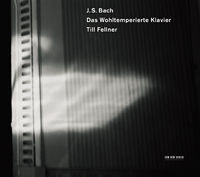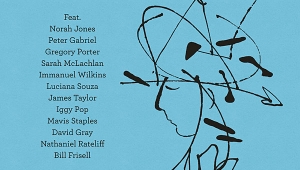| Columns Retired Columns & Blogs |
Recording of June 2004: J.S. Bach: The Well-Tempered Clavier, Book I
J.S. BACH: The Well-Tempered Clavier, Book I
Till Fellner, piano
ECM 1853/54 (2 CDs). 2004. Manfred Eicher, prod.; Markus Heiland, eng. DDD. TT: 116:58
Performance *****
Sonics *****
Till Fellner, piano
ECM 1853/54 (2 CDs). 2004. Manfred Eicher, prod.; Markus Heiland, eng. DDD. TT: 116:58
Performance *****
Sonics *****
To those who listen to Bach casually, this new recording of the Well-Tempered Clavier, by Till Fellner, is sheer pleasure—its legato line clean, graceful, and intelligently colored, its sound picture warm, clear, and inviting. But to those who follow Bach performance, the recording also signifies larger things—such as a triumphant culmination of the past 20 years of Bach on piano.
 In 1985, the much-celebrated 300th anniversary of the birth of Johann Sebastian coincided with the emergence of pianist András Schiff as a major recording presence. Prior to that, Bach seemed to be unofficially banned on piano everywhere but in ever-isolated Russia. Of course, there was Glenn Gould, but his obsession with clarity apologized for his instrument of choice, his later performances particularly negating the piano's distinctive expressive possibilities. Only the harpsichord was sanctioned by the historically informed performance community; even Bach pianist Rosalyn Tureck periodically defected to that instrument. Schiff's breakthrough came with no proof of academic validity; he silenced criticism through irresistible musicality.
In 1985, the much-celebrated 300th anniversary of the birth of Johann Sebastian coincided with the emergence of pianist András Schiff as a major recording presence. Prior to that, Bach seemed to be unofficially banned on piano everywhere but in ever-isolated Russia. Of course, there was Glenn Gould, but his obsession with clarity apologized for his instrument of choice, his later performances particularly negating the piano's distinctive expressive possibilities. Only the harpsichord was sanctioned by the historically informed performance community; even Bach pianist Rosalyn Tureck periodically defected to that instrument. Schiff's breakthrough came with no proof of academic validity; he silenced criticism through irresistible musicality.
He still does. But with his life increasingly taken up with other repertoire and conducting, Schiff's style of legato-but-not-opaque Bach has been taken up by others: first, with even more charm, by Angela Hewitt, and now, with even more probing intelligence, by Till Fellner.
Better known in Europe than in America, Fellner has made superb recordings of Mozart piano concertos, among other works, and has the unqualified endorsement of no less than Alfred Brendel, who as one of his teachers has said that Fellner has, "all the ingredients to be a great pianist and sustain a long career." So seemingly effortless and natural is Fellner's art that, at first, one doesn't know what to say, aside from one's sense that this is exactly the way the music should be. Then one is reminded that this is music for which the composer left few dynamic markings. It's tabula rasa—all interpreters must create their own version of Bach's world, and Fellner's is more rich and complete unto itself than any since the iconoclastic 1970s recordings by Sviatoslav Richter (RCA GD 60949).
Fellner takes an essentially vocal approach. Just as a great singer such as Renée Fleming creates the illusion of a floating vocal line, so does Fellner establish a sense of hovering sound, but one that takes on great specificity in characterizing Bach's intricate counterpoint. Nothing so new about that, but rarely has this sort of sound been used to accommodate so much detail of articulation or range of emotion, especially in that least vocal of musical forms, the fugue. One feels as if one is peering into a microscope and witnessing the inner workings of some wondrous organism. More superficially thrilling are Fellner's tempo accelerations: He can take off like a shot without breaking a sweat.
The Russian Bach pianists, such as Richter, achieved expressive range by enlarging the frame of Bach's music—sound and gesture took on heroic proportions, distorting form but with monumental results. In the B-minor prelude, for example, Richter delivers unforgettable existential despair; Fellner reveals that quality from a slightly safer distance while allowing other emotional colors to intermingle and revealing the graceful lines of the piece's musical architecture. Such a miniaturist approach, made possible by Fellner's ultra-refined technique, implies great and profound things with incredibly minute means.
Yet Fellner doesn't displace the recordings that have come before his. His Zen-like balance and integration of interpretive priorities is a lens through which one can re-appreciate the unlimited interpretive possibilities—both his and others'—in this supremely great music.—David Patrick Stearns
- Log in or register to post comments




































